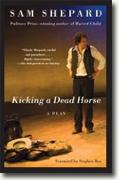Kicking a Dead Horse
Sam Shepard
book reviews:
· general fiction
· chick lit/romance
· sci-fi/fantasy
· graphic novels
· nonfiction
· audio books
· author interviews
· children's books @
curledupkids.com
· DVD reviews @
curledupdvd.com
newsletter
win books
buy online
links
home
for authors
& publishers
for reviewers

 |
Kicking a Dead Horse: A Play Sam Shepard Vintage Paperback 80 pages June 2008 |
|
Sam Shepard is a playwright determined to bring novelty to the Samuel Beckett school of drama: a paradox of sorts coupling full-on, in-your-face sensory experience (as opposed to abstractions, illusions, and “theatre”) with an almost nihilistic minimalist aesthetic. Shepard hones his audience’s attention on bare essentials—gestures, quirks of stage, and deadpan utterances—and thus makes them complete, dogma-free dramatic experiences. Kicking a Dead Horse
This is all well and good, but it means 70 pages of a man talking to himself, and Shepard, though poetic, is not poet who can rock your world with a verse. As a dramatic experience, Kicking a Dead Horse The problem stems less from unoriginality on Shepard’s part as from the intrinsic problem of reading this kind of drama. Whether plays are based in over-the-top special effects, moving actor vehicles, or ultra-minimal stagecraft and speech, they cannot convey anything close to their full effect on the page. Kicking a Dead Horse Fans of Shepard and dark absurdist theatre, read this play and take from it what you will. But do so knowing what you’re missing out on. Originally published on Curled Up With A Good Book at www.curledup.com. © Max Falkowitz, 2009 |
|
|
|
 Click here to learn more about this month's sponsor! |
|
| fiction · sf/f · comic books · nonfiction · audio newsletter · free book contest · buy books online review index · links · · authors & publishers reviewers |
|
| site by ELBO Computing Resources, Inc. | |
 The premise is bare-bones. A well-off white-collar man seeking out some “lost authenticity” out West is stranded in the middle of nowhere when his horse dies. The one-man show that follows depicts Hobart exploring his present situation and reflecting on his past. The usual philosophical machinations are here: he wonders how a body can feel unlike itself, what were the moments that led to the shift in his perception of his life from un-thought-about reality to sham, etc. Hobart voices them well: moving, but not eloquent; damaged, but not tortured artiste. Throughout it all the horse’s corpse—four stiff legs up to the sky—silently looms on stage as companion, interrogator, chorus, and peanut gallery rolled into one. Transcending a prop, it becomes a foil and dramatic “other” necessary to give the play some forward momentum, and Hobart’s interactions with it are some of the most interesting.
The premise is bare-bones. A well-off white-collar man seeking out some “lost authenticity” out West is stranded in the middle of nowhere when his horse dies. The one-man show that follows depicts Hobart exploring his present situation and reflecting on his past. The usual philosophical machinations are here: he wonders how a body can feel unlike itself, what were the moments that led to the shift in his perception of his life from un-thought-about reality to sham, etc. Hobart voices them well: moving, but not eloquent; damaged, but not tortured artiste. Throughout it all the horse’s corpse—four stiff legs up to the sky—silently looms on stage as companion, interrogator, chorus, and peanut gallery rolled into one. Transcending a prop, it becomes a foil and dramatic “other” necessary to give the play some forward momentum, and Hobart’s interactions with it are some of the most interesting.